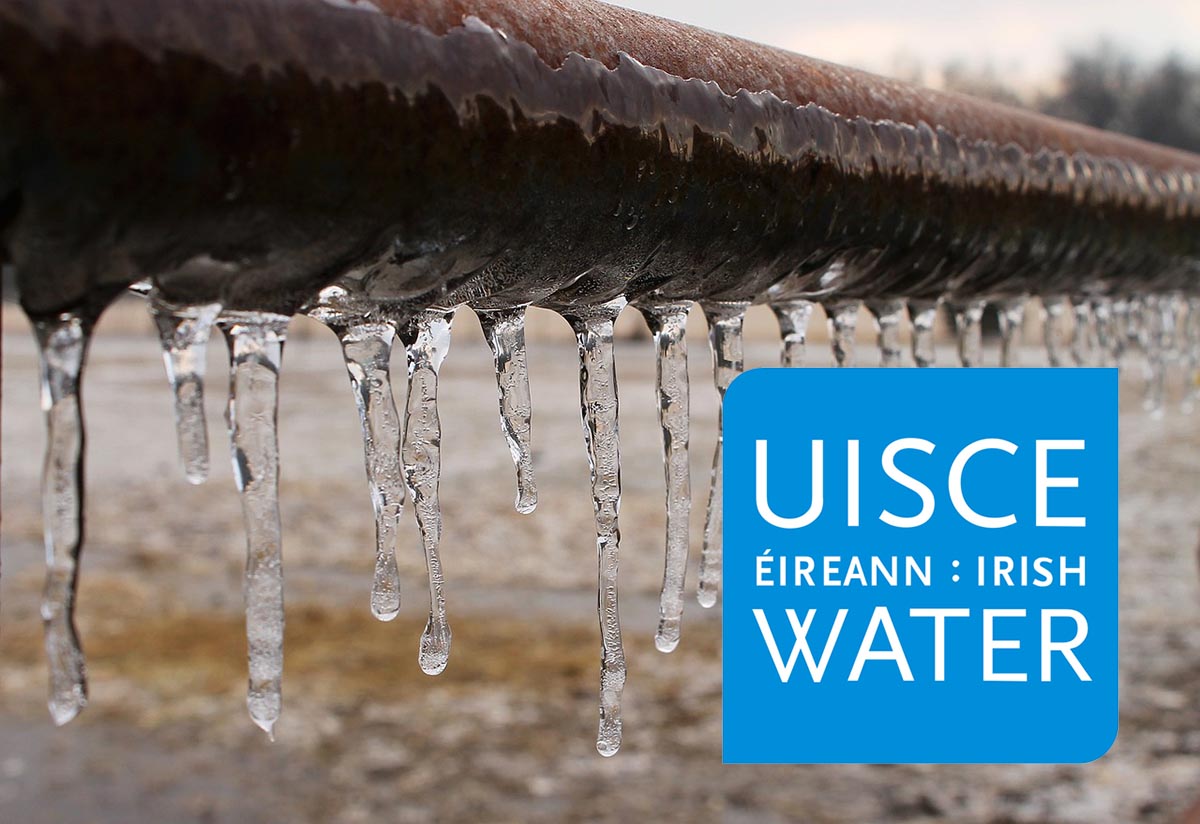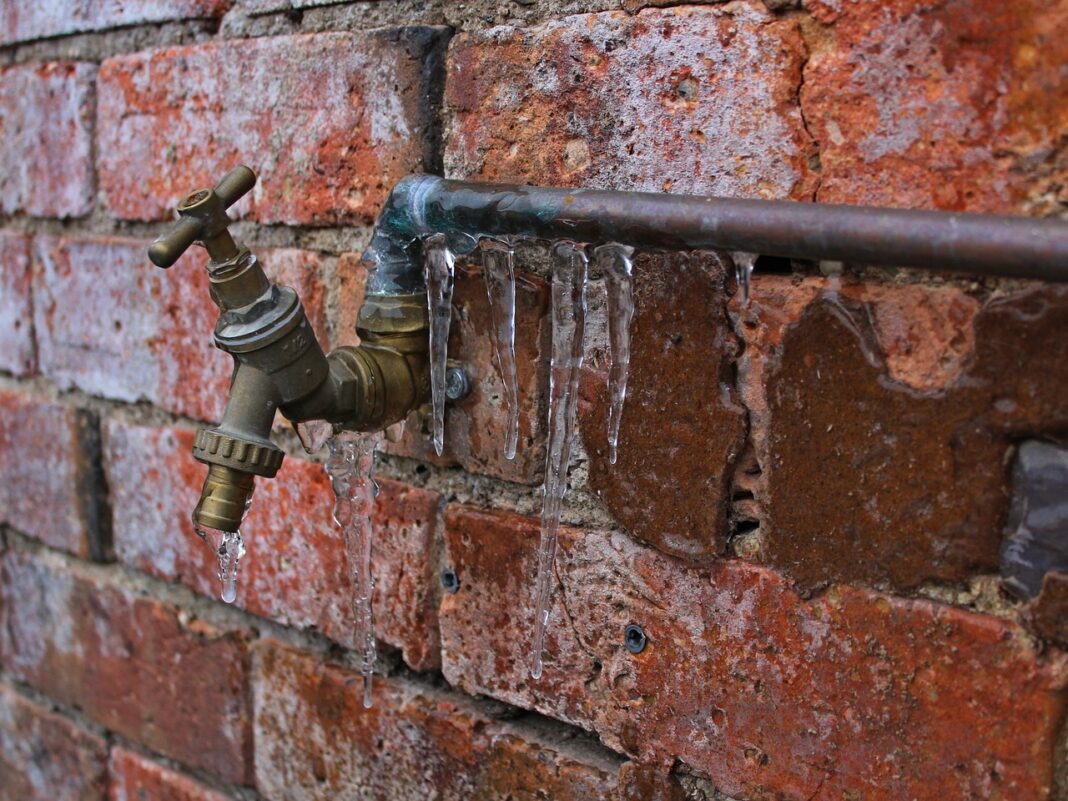With the cold snap expected to continue for the next few days, Irish Water is reminding customers that there are some simple steps they can take to protect against frozen pipes and bursts – and stay safe, warm and comfortable this winter.
The sub-zero temperatures in recent days have increased the number of frozen water pipes and bursts. Our crews on the ground are working in partnership with Local Authorities nationwide to maintain essential water and wastewater services. We are also liaising with the National Emergency Co-ordination Group and other key utilities to ensure an appropriate response to the ongoing weather conditions.
Customers can also do their bit to help avoid expensive repairs and a disrupted water supply at home or in their business/farm by taking a few easy preventative measures. These include checking outside pipes that can become frozen and burst during periods of cold weather and, if possible, turn off water supply to these areas or to any unoccupied premises. Alternatively, if the water system is left operational, you may consider setting the heating to come on periodically at a lower temperature. This allows warm air to circulate, and will help prevent pipes and tanks from freezing in the cold weather.
We would also ask people not to leave taps running as this will not necessarily prevent pipes from freezing and can impact on your local water supply.
Tom Cuddy, Irish Water’s head of Asset Operations offered this advice: “With the temperatures dipping below -5-degrees in some areas this week it is really important to continue the regular maintenance of your property, protect outside taps and farm troughs, and check empty premises. It also a good idea to familiarise yourself with your own internal water system and particularly how to turn off your supply at the stopcock so that you can protect your property in the event of a burst pipe.
“We also recommend that people don’t run taps continually as this is not an effective way of preventing frozen pipes and can cause other problems such as frozen drains. It also puts further pressure on water supplies that are already challenged by the freezing conditions. For example we recently saw an example of where a single hosepipe left running overnight resulted in 60 people being without water.
“To help people avoid issues like this and stay safe, warm and comfortable during the cold snap we have lots of helpful advice on our website, www.water.ie/winterproofing. There is also advice on general winter readiness at www.winterready.ie“.
The Irish Water Customer Care Team is also available to help 24/7 on 1800 278 278 and there is lots of advice on being winter ready on Twitter @IrishWater
What to do if you have a frozen pipe
Property owners are responsible for maintenance and repair of internal pipework on their own property.
If you have a basic knowledge of plumbing, these tips will help you locate and thaw a frozen pipe. If you are unsure of what to do, call a registered plumber.
Turn off the water supply, this will limit the amount of leakage or damage if a pipe bursts:
• Find and turn off your inside stop valve
• Turn off the stopcock in your cold water tank, usually located in the attic
Locate the pipe
• Check the water pressure in appliances such as taps and toilets to see if it is lower than usual
• Locate the general area where you think there may be a frozen pipe
• Check for visible pipes that are not insulated, pipes that feel much colder than others, have nearby draughts or damage
- Turn on nearby cold taps to relieve pressure on the frozen pipe. NEVER turn on the hot taps
Thaw the pipe
- If the pipe and fittings are not cracked or broken, you can try gently thawing the pipe
- Protect or move anything which might be damaged if the pipe bursts when thawed
- Use a hairdryer on the lowest setting to gently warm the pipe, starting at the end nearest the tap
- NEVER attempt to thaw out frozen pipes by switching on your immersion, central heating, blow torch etc.
What to do if you have a burst pipe:
A burst pipe can cause serious damage to your home so it is important to take action as soon as possible.
Limit the damage
• Turn off the water supply as instructed above
• Drain the system by turning on all the cold water taps and flushing the toilets
• Switch off the central heating and immersion. If you use solid fuel, let it die out
• When the water heating is completely off, turn on the hot taps to further drain the system
• If water from a burst pipe is leaking near any sockets, switches or appliances, switch off the mains if it is safe to do so. If the switch is wet, do not touch it, instead call a qualified electrician
• If you have a shared water supply e.g. if you live in an apartment complex, ensure you have access to the stop cock. This is usually located where the water supply enters the building
• Check with your neighbours that turning off the water has not affected their supply
Get it repaired
• You can make a temporary repair to a burst pipe by binding it tightly with a cloth or tape.
• Replace this as soon as possible by a permanent repair, carried out by a qualified and registered plumber.
• Ensure your hot water system is refilled BEFORE you switch back on your immersion or boiler.
To report a leak please contact Irish Water on 1800 278 278 or go to water.ie
On the Farm
There are a number of ways to turn off water in buildings or areas not currently in use on the farm; it can be done by turning off the mains at the stopcock or closing the valve alongside the meter in the boundary box.
While premises or outbuildings are unoccupied, it is even more important to regularly check buildings for leaks both inside and outside and to fix any external dripping taps as the water can freeze on the ground with the potential to cause slips and falls. If you are looking for further advice or support to assist in the maintenance of your water system, there are privately-operated commercial water services and leak detection businesses which offer a range of support services.
We also have dedicated conservation advice for the agriculture sector for both Summer and Winter here.

